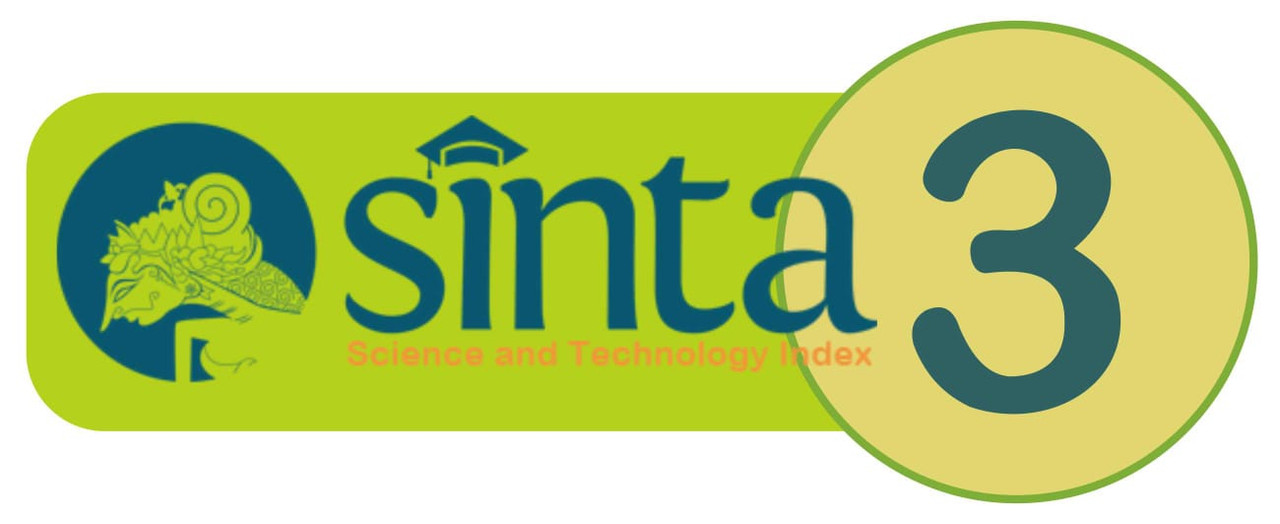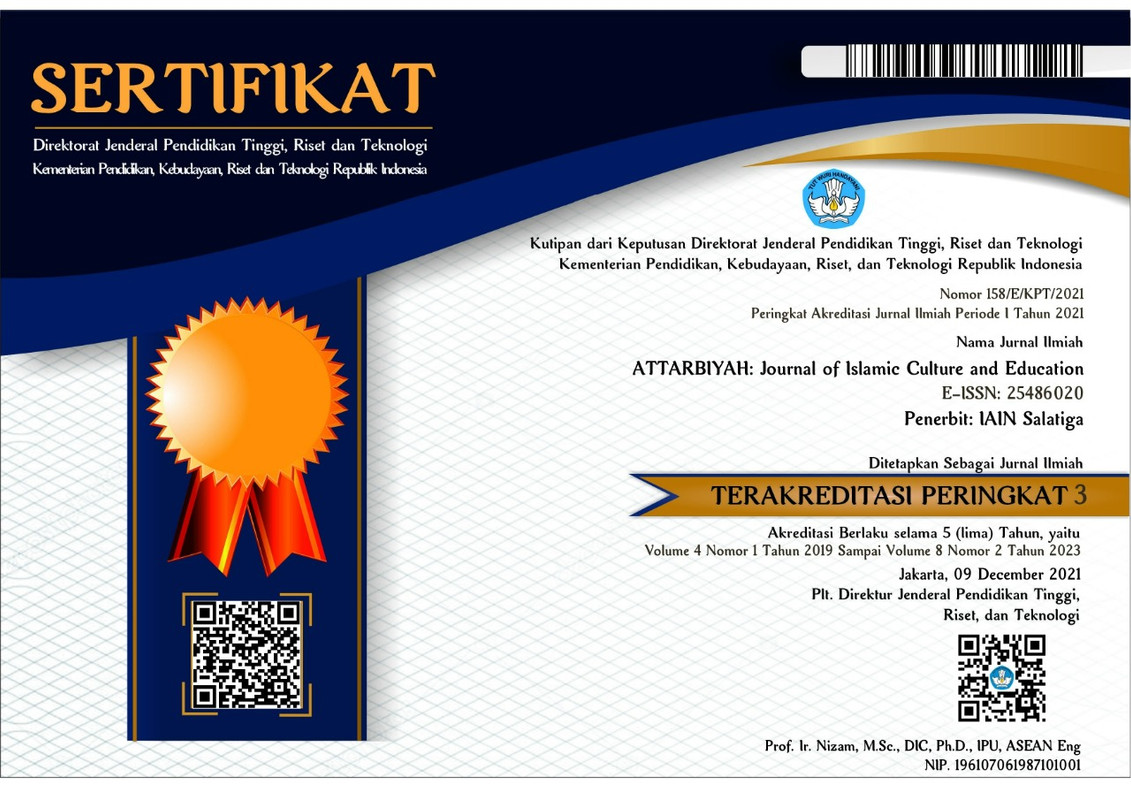Social responsibility and nationalism in school life: challenges of wasathiyah Islam
DOI:
https://doi.org/10.18326/attarbiyah.v10i1.33-50Kata Kunci:
nasionalism, social responsibility, wasathiyah IslamAbstrak
This research analyzes the implementation of wasathiyah Islam principles and the values of social responsibility and Nationalism through institutional policies and programs at MTs. NU Salatiga focuses on how these values are integrated effectively into religious, academic, and English education to foster a harmonious blend of Islamic values and national identity. The study was conducted at MTs. NU Salatiga, utilizing a descriptive qualitative method. The data was collected through observation, interview, audiovisual information, and documentation with ten respondents involving the principal, the vice principal for curriculum, the vice principal for student affairs, Islamic religious education and English subject teachers, and five students. Meanwhile, the data analysis involved three main steps: reduction, display, and conclusion. The result of the research proved that integrating the principles of wasathiyah Islam with social responsibility and nationalism values had been effectively implemented at MTs. NU Salatiga through well-structured policies and programs. This research provides theoretical implications by strengthening and expanding the concept of wasathiyah Islam as a practical educational approach to integrating religious values and Nationalism into the formal school curriculum.
Referensi
Abidin, Z., Sauri, S., Husaini, A., & Bahruddin, E. (2022). Wasatiyah-based Islamic education learning in high school. Journal of Positive School Psychology, 6(8), 6164–6182. https://doi.org/10.37985/murhum.v5i2.921.
Abriellia, N., Mutohar, S., & Mustakimah. (2024). Meningkatkan nilai agama dan moral melalui pembiasaan sholat dhuha. Murhum: Jurnal Pendidikan Anak Usia Dini, 5(2), 538–548. https://doi.org/10.37985/murhum.v5i2.921.
Ahmed, J. N., Ali, R. P., & Malik, M. (2021). The role of teacher training programs in optimizing teacher motivation and professional development skills. Bulletin of Education and Research, 43(2), 17–37.
Astuti, N., Khairani, F., Destini, F., & Sulistyawati. (2021). The role of scout activities and learning environment at school toward students' characters. International Journal of Educational Studies in Social Sciences (IJESSS), 1(1), 28–37. https://doi.org/10.53402/ijesss.v1i1.4.
Banin, M. C., Karimah, U., Basit, A., Irfan, A., & Yunus, A. (2023). Collaboration Between Religion Teacher and Counselor in Shaping Student Morals. Pamomong: Journal of Islamic Educational Counseling, 4(1), 25–42. https://doi.org/10.18326/pamomong.v4i1.25 .
Creswell, J. W. (2012). Educational research (Vol. 11, 4th ed., P. A. Smith, Ed.). Pearson.
Creswell, J. W., & Creswell, J. D. (2018). Research design: Qualitative, quantitative, and mixed methods approaches (5th ed., H. Salmon, C. Neve, M. O'Heffernan, D. C. Felts, & A. Marks, Eds.). Sage Publications.
Dechant, A. (2011). Influence of friendship on motivation and academic achievement [Master's thesis, Fort Hays State University.
Đurišić, M., & Bunijevac, M. (2017). Parental involvement as an important factor for successful education. Center for Educational Policy Studies Journal, 7(3), 137–153. https://doi.org/10.26529/cepsj.291.
Islamiyah, U. H. (2017). The implementation of Islam wasathiyah thought in Dayah Darul Hikmah Islamiyah, West Aceh. Konfrontasi Journal: Culture, Economy and Social Changes, 3, 376–384.
Kurniawati, A., Sutarno, & Sariman. (2023). Integration of Islamic spiritual emotional and intellectual education in vocational high schools. Ta'dib: Jurnal Pendidikan Islam, 11(2), 229–240. https://doi.org/10.29313/tjpi.v11i2.10542.
Lyu, M., Li, W., & Xie, Y. (2019). The influences of family background and structural factors on children's academic performances: A cross-country comparative study. Chinese Journal of Sociology, 5(2), 173–192. https://doi.org/10.1177/2057150X19837908.
Metcalfe, J., & Moulin-Stożek, D. (2020). Religious education teachers' perspectives on character education. British Journal of Religious Education, 43(3), 349–360. https://doi.org/10.1080/01416200.2020.1713049.
Miles, M. B., Huberman, A. M., & Saldaña, J. (2016). Qualitative data analysis. Nursing Standard, 30(25), 33. https://doi.org/10.7748/ns.30.25.33.s40.
Mukiyat, C., Jaiman, M., Prayogo, M., Yanti, N., Latifah, L., Aruan, N., Sepridiana, I., Sari, H., Fausanah, V., & Safira. (2023). Monday's flag ceremony activities as a representation of love for the homeland and improving character education for all students in Village Pulau Cawan. Indonesian Journal of Advanced Social Works (DARMA), 2(4), 311–320. https://doi.org/10.55927/darma.v2i4.6253.
Muzdalifah. (2020). The role of Islamic religious education teachers in fostering student morals at MTS Al-Hikmah Cupel. Jurnal Al-Fikrah, 3, 75–89.
Nurhakim, H., Sanusi, I., Nur'aeni, U., & Muhammad, G. (2024). Implementasi profil pelajar Pancasila guna pencegahan tindak perundungan siswa. Tapis: Jurnal Penelitian Ilmiah, 8(2), 166–178. https://doi.org/10.32332/tapis.v8i2.9438.
Pratama, N., & Salsabila, B. (2023). The role of a teacher in education and moral development in students. International Journal of Students Education, 1(2), 358–360. https://doi.org/10.62966/ijose.v1i2.447.
Rahmalia, N., Mubarak, Z., & Gunawan, A. (2024). Pengaruh pembiasaan shalat dhuha berjama'ah terhadap kedisiplinan belajar siswa kelas VIII di MTs Al-Ahsan Kota Bogor. Journal of Islamic Education Management, 4(1), 303–313. https://doi.org/10.47476/manageria.v.
Sa'adi. (2021). Countering Islamophobia in Portugal: Experience of Indonesian Muslim expatriates. Indonesian Journal of Islam and Muslim Societies, 11(1), 29–53. https://doi.org/10.18326/ijims.v11i1.29-53.
Sasmita, C. D., & Aryani, I. K. (2024). The effect of flag ceremony implementation on the nationalism attitude of Putera Harapan Three Language Elementary School students. In The 3rd International Conference on Education Innovation and Social Science (pp. 129–135). International Conference on Education Innovation and Social Science.
Seligman, M. E. P., Ernst, R. M., Gillham, J., Reivich, K., & Linkins, M. (2009). Positive education: Positive psychology and classroom interventions. Oxford Review of Education, 35(3), 293–311. https://doi.org/10.1080/03054980902934563.
Shobri, A. (2024). The contradiction in hadiths regarding praying on a conveyance. Nabawi: Journal of Hadith Studies, 5(1), 31–59. https://doi.org/10.55987/njhs.v5i1.141.
Sirait, R. A., & Malau, M. (2022). Menilik sejarah perkembangan agama-agama di Indonesia. Journal of Religious and Socio-Cultural, 3(2), 151–169. https://doi.org/10.46362/jrsc.v3i2.90.
Subandi, A. F., Afriyadi, M. M., & Ramli, M. (2019). Implementing multicultural and moderate Islamic education at the elementary schools shapes the Nationalism. Tadris:Jurnal Keguruan dan Ilmu Tarbiyah, 4(2), 247–255. https://doi.org/10.24042/tadris.v4i2.5003.
Sudirman, M. Y., Saputra, R., & others. (2024). Finding spiritual balance: A study of the effectiveness of Islamic counseling in improving college students' well-being. International Journal, 1(1), 271–278.
Sugito, N., Aulia, R., & Rukmana, L. (2020). Pancasila as the establishing ideology of Nationalism Indonesian young generation. In Proceedings of the International Conference on Community Empowerment and Engagement (ICCE) (Vol. 524, pp. 177–182). Atlantis Press. https://doi.org/10.2991/assehr.k.210204.027.
Wairisal, P. L., Sukarma, I. K., Pamungkas, M. I., Harefa, E., Husnita, L., & Nazmi, R. (2025). Teachers' moral education and social competence: Their influence on student character formation at Madrasah Aliyah Negeri in Padang. Journal of Ecohumanism, 4(1), 5279–5289. https://doi.org/10.62754/joe.v4i1.6462.
Wasehudin, W., & Syafei, I. (2021). Religious moderation-based Islamic education model by Nahdlatul Ulama at Islamic boarding schools in Lampung Province. Tadris: Jurnal Keguruan dan Ilmu Tarbiyah, 6(1), 53–61. https://doi.org/10.24042/tadris.v6i1.8622
Widianti, R., & Oktaviani, H. (2024). Implement school rules and punishment for students who violate it at SMK Negeri 2 Pagaralam. Journal on Education, 6(4), 20733–20741. https://doi.org/10.31004/ joe.v6i4.6155.
Zhang, C. X., Fong, L. H. N., Li, S. N., & LY, P. (2019). National identity and cultural festivals in postcolonial destinations. Tourism Management, 73, 94-104. https://doi.org/10.1016/j.tourman.2019.01.013.
Unduhan
Diterbitkan
Cara Mengutip
Terbitan
Bagian
Lisensi
Hak Cipta (c) 2025 Alya Khasanatul Ulya, Sa'adi

Artikel ini berlisensiCreative Commons Attribution-ShareAlike 4.0 International License.







